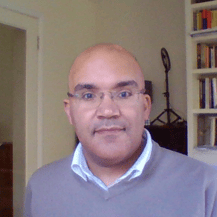What’s it really like to complete a degree online? Hear from two Queen Mary Online graduates.
Kyle Melville studied the Queen Mary Online International Dispute Resolution LLM and is currently practicing law in Johannesburg, South Africa, while Jonathan Eason studied the International Relations MA and is currently working in the UK public sector, while living in Cambridge, England.
We sat down with Kyle and Jonathan to ask them about what motivated them to study online, how they balanced studying with work and other commitments and what the support was like from academics and other University staff.
Read on to find out more from our two Queen Mary Online graduates:
Can you tell us a little bit about your background and how getting a master’s has impacted your career so far?
 Kyle: I did my undergraduate degree in Pretoria, South Africa. Once I finished, I was looking for something a bit different and was initially supposed to do the LLM in person in London. Thanks to the pandemic, I ended up doing the online programme, which was just as exciting.
Kyle: I did my undergraduate degree in Pretoria, South Africa. Once I finished, I was looking for something a bit different and was initially supposed to do the LLM in person in London. Thanks to the pandemic, I ended up doing the online programme, which was just as exciting.
I think having done the International Dispute Resolution LLM, I'm very lucky to be able to use it every single day with the firm I work for. I'm passionate about the area and it's something I think gives me a competitive edge over people in a similar position. Career-wise, it's been beyond beneficial, and I think there's still a lot to come.
Jonathan: I graduated from my undergraduate degree at Queen Mary in 2006. I came back to Queen Mary for my International Relations MA because I enjoyed my undergraduate so much, and the opportunity to study online meant that it would fit around all my other family and work commitments. 
I began working in the UK public sector very recently after finishing my master’s. Meeting lots of different people, as well as the academic rigor of the course, has set me in good stead for my career. It’s especially helpful for building relationships, which is quite important in my work.
How have you found using Canvas, the virtual learning environment?
Kyle: I think Canvas works extremely well. It doesn't take long to get to grips with the platform and how it works. It’s quite easy to navigate between course notes, lecture slides, and everything else you need. Canvas offers opportunities to interact with your fellow classmates, whether in formal discussions or informally.
Jonathan: One of the great things about the Canvas platform is that you can see what's coming up and you can make sure that you've got all your resources in place. Your assignments are also all there, along with all the links for submitting them. There's no having to worry about rushing to the department to hand your assignments in on time. With Canvas, it's just a click of a button and it's a great feeling once you've seen your assignment’s been uploaded, especially with the dissertation.
What was the support like from the academics at Queen Mary?
Kyle: The support from the LLM academics was incredible. They were always willing to have a quick call if needed or respond to an email. Everyone was beyond helpful.
I'd also just like to mention the other Queen Mary staff. Whether it was learning how to use Canvas or answering other questions about graduation or career advice, the staff really helped me feel comfortable with the whole programme.
Jonathan: The academic staff on the International Relations programme were always available by email and were quick to respond. They were also always happy to have a one-to-one chat online in the Canvas platform.
How did you get to know other students online?
Kyle: I was lucky enough to be part of a cross examination moot court team with a couple of peers and I’m doing some moot coaching this year with Queen Mary. I'm still in regular contact with people I've never had the pleasure of meeting in person but hope to meet at graduation. It shows the benefit of a programme like this. There are countless networking opportunities.
Jonathan: Even though we were in different time zones across the globe, we were all still able to talk in tutorials, and through the WhatsApp group that our cohort set up. You could send a message at, say, 9pm in the UK and someone would answer, somewhere in the world, wherever they were.
Interested in more insights into what it's like to study International Relations online? Graduate Abir Chowdhury shared his experiences:
How did you balance work, study and other commitments?
Kyle: It’s a massive commitment but I've always said that what you put into a programme like this is what you will get out in return.
From a personal point of view, it does take quite a bit of sacrifice of your free time. You need to accept that the programme is demanding, despite its flexibility, and will require a great deal of effort.
Professionally as well, balancing studying with work is never an easy task. Having said that, I think the programme also teaches you how to prioritise.
What worked well for me was setting aside specific blocks of time on the weekend, just to make sure I stayed on top of the work. With a programme like this, work can mount up and it can be very difficult to catch up if you fall a bit behind.
I think it depends on how you work best, but a routine is always good. Also, being able to read an article while you're on lunch or on the train or anything like that, can just chip away at the workload. It really will pay dividends in the end.
I think enjoying the programme is highly underrated. It's a fantastic learning opportunity and if you're passionate and you enjoy it, it's even better. If you're willing to do the work and stay on top of the workload, I think success will come.
Jonathan: I can concur with Kyle about the sacrifice. There were lots of weekends when I wasn't around so much as I was reading or writing assignments. However, I've found that if I set time aside, I still had time for my family and for all the other things that I needed to do. Discipline helps with that.
I always had a Monday and Tuesday when I would get all my reading done, ready for the webinars on the Wednesday or Thursday. The reading is broken up very nicely. A lot of the suggested readings are laid out for you, except for the dissertation where obviously that's led by yourself.
What have you enjoyed most about studying online?
Kyle: For me it's a completely new challenge. If you factor in studying at one of the top universities in the world and being able to do that wherever you are, I think it's an incredible opportunity and way to learn. There’s more and more agile working around the world, which brings its own challenges and studying online helps you prepare for that.
Jonathan: I was really excited to have the opportunity to study online with Queen Mary. It gave me the opportunity to meet lots of new people from all over the world with different perspectives. It gave me lots of new ideas and it helped to add a different dimension to my academic study.
Thank you to Kyle and Jonathan for sharing their thoughts on studying online with Queen Mary!
Want to know more about what it's like to study an LLM online? We spoke to Lawyer Juan Cilliers about his experience:
.png?width=280&height=74&name=logo%20(1).png)



 Follow us on Twitter
Follow us on Twitter Like us on Facebook
Like us on Facebook